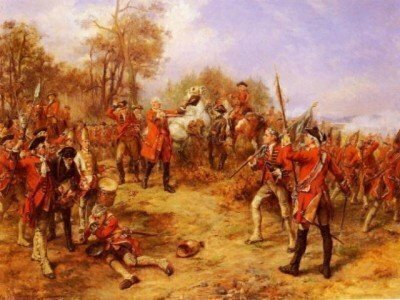Could British troops evict colonists from their homes, eat their food and use their facilities? That’s not exactly true, even though generations of students have heard that story in relation to the Third Amendment.
 Today is the anniversary of the parliamentary act that allowed British soldiers to occupy certain colonial buildings. The first Quartering Act in 1765 didn’t go over well with the American populace, and a constitutional amendment later ensured such things wouldn’t happen again once the United States broke away from Britain.
Today is the anniversary of the parliamentary act that allowed British soldiers to occupy certain colonial buildings. The first Quartering Act in 1765 didn’t go over well with the American populace, and a constitutional amendment later ensured such things wouldn’t happen again once the United States broke away from Britain.
But the British military rarely took over private homes when it sought shelter during its occupation of the Americas.
Before the parliament passed the first Quartering Act in 1765, the French and Indian War had concluded two years earlier. Until then, the Colonials had little experience with quartering or being forced to give food and shelter to British troops without compensation.
In fact, the English Bill of Rights barred people from having to host redcoats inside their homes and it also frowned upon the King establishing standing armies during peacetime. But during the French and Indian War, the British military forcefully took over some private homes, and it argued with New York and Pennsylvania in 1756 about occupying other buildings.
After the war concluded and the Colonists realized the British army wasn’t leaving, the stage was set for conflict. The British government wished to exert more direct control over the Colonies in the war’s aftermath, and it decided to leave a standing army in America, with many of the British troops to be stationed in New York.
The Quartering Act of 1765 was proposed in parliament in March and later passed as an amendment to the Mutiny Act. The act didn’t allow the British military to forcefully take over private homes in the Colonies, unlike the popular image of the Redcoats staying rent free at some poor person’s house.
But the act allowed the military to take over practically everything else. The Colonies were required to build barracks for soldiers, and if there wasn’t enough room in the barracks, the housing was extended to “inns, livery stables, ale houses, victualling houses, and the houses of sellers of wine.”
And if there wasn’t enough room in the taverns, the Colonies were forced to provide lodging in “uninhabited houses, out-houses, barns, or other buildings.” (In regard to out-houses, the British were talking about sheds, since the modern use of the word “outhouse” as a privy or toilet wasn’t commonplace until the post-Colonial period.)
The initial reaction to the Quartering Act in America was fear about British troops ignoring its intent and deciding to seek quarters in private homes. But soon, the Colonists realized that they would be paying for much of the costs of “quartering” British troops as a passive tax that was levied without the consent of colonial legislatures.
So the act ignited anger about taxation without representation, especially in New York and Massachusetts. As more troops poured into Boston, fears grew about the presence of a large standing army in the Colonies.
In the ensuing years, the location of troops stationed within Boston, in close contact with the locals, caused problems and culminated with the Boston Massacre in 1770.
Four years later, a second Quartering Act was passed by parliament that allowed troops to be quartered, if needed, in unoccupied private homes and commercial property. But it didn’t allow for troops to take over occupied houses.
The fear and opposition to the problem of quartering were included in the Declaration of Independence, where grievances against the King included “quartering large bodies of armed troops among us.”
And the Third Amendment to the Constitution specifically addresses this issue.
“No Soldier shall, in time of peace be quartered in any house, without the consent of the Owner, nor in time of war, but in a manner to be prescribed by law,” the amendment reads.
Today, there are few court cases about quartering and the Third Amendment, but the fears engendered by the Quartering Acts are linked to two other amendments. The need for a well-regulated militia described in the Second Amendment was a counterbalance to a standing army, while the home as a zone of privacy is a key concept in the Fourth Amendment.







